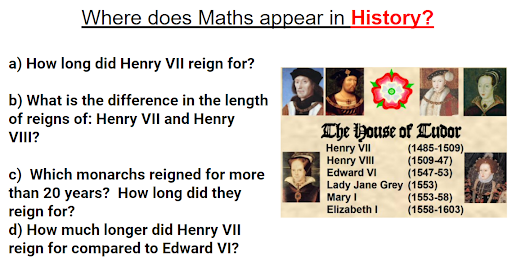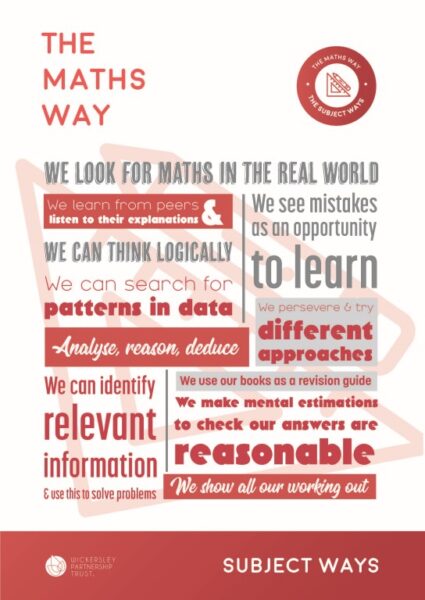Curriculum
Maths

Mrs Thompson
Faculty Leader – Maths
Subject Staff
Mrs Liversidge, Mrs Horner, Mr Dolby, Mr Heathcote, Mr Jones, Miss Weatherill, Miss Williams, Ms Razaq, Mr Thompson
Exam Board
Edexcel
The Subject Way
Firstly, to teach students the vital skills they need to achieve their full potential and gain the very best grades they can. Secondly, to teach students how each subject relates to the wider world, incorporating the life skills they will learn.
It is our belief that knowing how what you learn links to the wider world brings a subject to life and therefore improves overall understanding and engagement.
Curriculum Intent
At Clifton we understand that getting the curriculum right for each and every individual student is the single most important factor in ensuring progress, encouraging positive engagement and raising aspirations.
At Clifton, we want all students to leave able and qualified to play their full part in an ever-changing world through an ambitious, creative and innovative curriculum, which empowers students with the skills, knowledge and attributes to allow them to succeed in their next phase of education and their working life.
We aim to engender a love of learning, self-belief and aspiration through 4 key intentions:
- The removal of barriers to learning
- Developing skills for learning
- Developing personal attributes (Clifton Way)
- Enriching student experiences and broadening their horizons
Our curriculum is not driven by performance tables. It is our belief that a strong, broad, balanced curriculum, tailored to individual needs can remove barriers to learning and allow all students to access the curriculum appropriate to them and will therefore meet their individual needs.
We believe in a strong foundation of core subjects including English, Maths and Science. All students who are identified with deficits in literacy and numeracy are given additional curriculum support. These core fundamental skills are essential in both accessing our broad curriculum offer and the next stage of life; be it education, employment or training.
Intention 1 – The removal of barriers to learning
We want all our students to go out into the world, and become successful, happy, fulfilled adults who will be good citizens and make a positive contribution to society. The acquisition of basic skills is either at the heart of achieving this or a barrier to learning and prevents students from fully flourishing. Four common barriers, if left unchallenged, will limit the progress, engagement and development of students who access our curriculum.
They are:
- Literacy
- Numeracy
- Oracy
- Vocabulary
We see these barriers as a high priority for the school. In order to prevent them from becoming a barrier for student development and progress we implement (and closely monitor) the following strategies:
Literacy
Ensuring learners access reading and writing opportunities within a maths lesson is non-negotiable. Learners regularly work on worded problems and investigations, all of which require learners to build on their literacy skills and give reasoning for their answer. Goal free problems are also used as a method to assist learners with their approach to questions that may require more reasoning or literacy skills.
Our assessments are carefully written to ensure that learners are regularly assessed on reasoning and problem solving questions and the weighting of these questions is in line with that of formal examinations. Learners are encouraged to underline key terminology and identify what is needed to complete the problem.
Numeracy
Naturally, numeracy is one of the barriers that mathematics focuses on intensely as numerical proficiency correlates well with success in mathematics. We aspire to remove the barrier that numerical fluency places in front of effective study of mathematics. We make use of numeracy tasks to give learners the opportunity to practise, discuss and embed skills that we feel are critical for future success. Number plays a large role within the mathematics curriculum and is interleaved multiple times over the 5-year journey to embed and develop numeracy skills. Our numeracy intervention is well sequenced and supplements the curriculum to ensure that all learners leave numerate.
Oracy
Whilst communicating in a written medium is important, being able to communicate complex mathematical ideas effectively is essential for learners to thrive. Staff model mathematical language during lessons and encourage opportunities to allow students to develop an argument, justification or proof. Questioning, discussion and reasoning is how we encourage learners to approach their lessons so that they can articulate their understanding of abstract topics to further their learning and improve their confidence when speaking in front of peers.
Vocabulary
Mathematics is a subject that is almost like a language in its own right and learners being confident of word definitions often makes the difference between understanding a question or not. As such, we focus on vocabulary and command words each lesson giving learners the support they need to understand the words. It is our aim to make our learners “word rich” so that they can speak and write about mathematics with confidence. The Frayer Model is used within the curriculum to expose learners to academic language on a regular basis.
Intention 2 – Developing Skills for Learning
Developing student knowledge and essential learning skills go hand in hand. Students need to remember with fluency in order to be fully established mini-subject specialists. We strive, at all times, for personal excellence by developing the 6 key skills for success:
- Recall
- Interpretation
- Creativity
- Analysis
- Evaluation
- Divergent thinking
Retrieval is an essential skill in mathematics. The ability to apply and recall knowledge quickly is crucial to support progression in mathematics as it frees up working memory to allow learners to engage with problem solving. We interleave previously studied content by using retrieval tasks as lesson starters labelled ‘flashback’. Our curriculum follows a mastery approach giving learners time to persevere, work on topics in-depth for longer periods of time, thus enabling learners to move fluently between mathematical ideas.
In order to ensure that pupils have the required prerequisite knowledge, the curriculum highlights the key skills for each small step and these are embedded within lessons as ‘get ready’ tasks. If the required knowledge isn’t there, lessons are adapted to ensure that all pupils are able to access the lesson and are appropriately supported and challenged.
Generalisation in mathematics takes the patterns that we see in number, algebra and geometry and tries to define a rule for those patterns. We use modelling, derivations and investigations in class to help learners develop their interpretation, analysis and evaluation skills as they seek to generalise what is often abstract content. Problem solving is also a crucial part of mathematics allowing learners to think creatively.
We structure our curriculum to allow learners more time on each strand of learning to not only embed skills but also to facilitate the time to engage with solving problems that linktogether the vast plethora of mathematics they study.
Intention 3 – Fostering personal attributes
Our curriculum promotes the skills and attributes our children need in order to develop the independence, responsibility, accountability and resilience they need to have a happy and successful life. We refer to this crucial aspect of our curriculum intent as The CliftonWay and it is embedded in everything we do.
The Clifton Way enables us to develop well-rounded individuals ready for the next stage. It is about embedding employability skills such as resilience, collaboration, communication, aspiration, responsibility, tolerance and respect in order for them to be an active participant in the local community and beyond.
The Clifton Way is embedded in assemblies, form periods and our extra-curricular programme. It is the language that we speak and key aspects of the Clifton Way are as follows:
- We are nice to people
- We say please and thank you
- We are equipped to learn
- We work hard
- We are prepared to make mistakes
- We listen to others
- We believe in ourselves
- We are proud of our achievements
- We take pride in our appearance
- We take responsibility for our actions
- We take risks
- We dream big
Intention 4 – Enriching student experiences and broadening their horizons
Our intent is that all students have a full understanding of how to develop themselves as well rounded citizens, maintain healthy relationships and understand how to keep themselves safe both online and in their day-to-day life. We want all students to know what options are open to them in the future and understand the routes they have in order to progress on their life journey. Our curriculum will include:
- Exposing learners to worded problem-solving questions based on real life situations
- Measuring distances and working with time in PE lessons
- Tabulating and graphing results in science and geography lessons
- Opportunities throughout the curriculum that expose learners to careers involving mathematical knowledge and skills.
- Opportunities throughout the curriculum to learn about mathematics in different cultures and across the ages
- Celebrating mathematical focus days (such as Pi Day and Number Day)
- Emphasis on financial maths skills during Money Matters Week in Key Stage 3 in line with the PSHE curriculum
- Encouraging participation in maths challenges (such as UKMT individual and team events)
- Ganes clubs to encourage curiosity and logical thinking
Our Curriculum
Key Stage 3
Using KS2 results, students are placed in sets on entry to school. Students have three 80 minute maths lessons each week. The topics studied build in difficulty and we aim to ensure the KS2 skills are solid before working up to GCSE standards. Homework is set weekly via vle.MathsWatch.co.uk. The department uses regular assessments and ‘sticker tasks’ to assess the understanding that students have developed, thus allowing us to plan their next steps and meet their needs more effectively. Each assessment will be followed by a bespoke intervention task for each pupil, allowing them to work on and improve in any areas they may struggle with.
| Year 7 2021-22 | ||||||
| Autumn Term | Sequences | Algebraic Notation | Equality and Equivalence | Place Value and Ordering Integers | Fraction, Decimal and Percentage Equivalence | Addition and Subtraction |
| Spring Term | Multiplication and Division | Directed Numbers | Fractional Thinking | Fractions and Percentages of Amounts | Constructing and Measuring | |
| Summer Term | Geometric Reasoning | Developing Number Sense | Sets and Probability | Prime Numbers and Proof | ||
Year 8 2021-22 | ||||||
Autumn Term | Ratio and Scale | Multiplicative Change | Multiplying and Dividing Fractions | Working in the Cartesian Plane | Representations of Data | Table and Probability |
Spring Term | Brackets, Equations and Inequalities | Sequences | Indices | Fractions and Percentages | Standard Index Form | Angles in Lines and Polygons |
Summer Term | Area of Trapezia and Circles | Symmetry and Reflection | The Data Handling Cycle | Measures of Location | Straight Line Graphs | |
Year 9 2021-22 | ||||||
Autumn Term | Forming and Solving Equations | Testing Conjectures | Three DImensional Shapes | Constructions and Congruency | Numbers | Using Percentages |
Spring Term | Deduction | Rotation and Translation | Pythagoras | Enlargement and Similarity | Maths and Money | |
Summer Term | Solving Ratio and Proportion Problems | Rates | Probability | Algebraic Representation | Congruence, Similarity and Enlargement | |
Key Stage 4
All students have 3 lessons per week and the course is assessed by 3 terminal papers, each lasting 90 minutes and worth 80 marks per paper. Students work towards the EDEXCEL Linear GCSE (2 calculator papers and 1 non-calculator paper). Tiers of entry for each student is carefully considered to allow every student to achieve their best possible outcome at the end of year 11.
We aim for students to enjoy maths and increase their confidence, building on the skills and understanding they have formed in KS3. Students need to be able to use and apply their maths in real world settings, particularly with the new focus on problem solving and mathematical reasoning at GCSE. Students are supported and their progress carefully monitored throughout the course. There will be some students who will require additional support; and they will be able to access intervention as appropriate.
Students have regular topic tests and these, alongside homework, allow staff to check the ongoing understanding of the students. The use of mock exams in both year 10 and 11 allows the students to be comfortable and confident in an examination setting as well as helping them to target their revision more effectively. Home learning includes vle.MathsWatch.co.uk for both homework and independent revision. Other recommended sites include corbettmaths.com and mathsgenie.co.uk.
Year 10 Foundation 2022-23 | ||||||
|
Year 10 Higher 2022-23 | ||||||
|
Year 11 Foundation 2022-23 | ||||||
|
Year 11 Higher 2022-23 | ||||||
|
Careers in the Curriculum
Throughout our KS3 curriculum all pupils will link their learning to other subjects. Each half term pupils will see a different subject and the connections between what they have learnt throughout their time at school with us. Please see an example below of how a Year 7 lesson links to History and the understanding of reading from tables.

Money Matters Curriculum
As well as exposing our pupils to their Maths lessons, all pupils will be exposed to a “Money Matters Curriculum.” These sessions will be delivered in their Maths lessons and link real life financial elements to help prepare all of our pupils leave school able and qualified to enter the real world.
Key Stage 3
Y7
Bank and Banking – Learning about financial services and using information and advice to make financial decisions.
Budgeting Challenge – Understanding the budgeting process and appreciate that budgeting may involve having to make choices within financial limits.
Cost of living – Understanding how to plan and keep track of their money and appreciate the possible consequences of not managing debt responsibly.
Debt – Understanding what debt is and how it can be a problem and appreciate the possible consequences of not managing debt responsibly.
Y8
Money and Consumer Choices – learning that money decisions can affect others and ourselves.
Budgeting Challenge – Understanding the budgeting process and appreciate that budgeting may involve having to make choices within financial limits.
Money Safety – Understanding how to recognise and avoid potential fraudulent situations and appreciate that being a victim of fraud may affect us emotionally as well as financially.
Saving and Borrowing – Understanding how and why saving and borrowing can help us to manage our finances and appreciate that interest payments play an important part in our personal finances.
Budgeting – Learning how to plan and budget.
Exploring Economies – Recognising the important role money plays in our economic well-being, understanding how this country’s economy works in relation to the economies of other countries and appreciate how changes in the national economy can affect personal finances.
Y9
Inflation Investigation – Recognising the important role money plays in our economic well-being, understanding that monetary inflation has implications for the whole country and appreciate how changes in the national economy can affect personal finances.
Saving – Knowing that saving money can enable better liner term money management.
Talking Tax – Recognising the important role money plays in our economic well-being, appreciate that certain taxes affect everyone and understanding the role a tax-collecting body plays in the economy.
Branding – Recognising how branding can influence our spending choices and compare one product against another in terms of its taste, appearance and packaging etc and make a ‘best value’ judgement.
Key Stage 4
Y10
What do banks do? – Recognising that banks can provide a range of financial services and products, appreciate that while banks help us manage our money, they are also businesses and know that they might have to make choices about financial products and services in the future.
Holiday fun at home – Understanding that there are different ways to calculate value for money and that price is only one factor and know how to use financial information to plan, manage and adjust personal budgets.
Sources of financial information – Understanding that there is a wide range of financial information available, appreciate the difference between advice and information and recognising that some financial information and advice might be more impartial than others.
Long term planning and borrowing – Knowing about longer term financial planning and borrowing.
Department Staff
S Liversidge
Head of Department
- sliversidge@cliftonschool.org
T Dolby
P Heathcote
L Thompson
E Weatherill
S Burns
Revision
Find out more
If you would like more information about our curriculum, please contact Mrs Leng, Headteacher using the details on our contact page.




